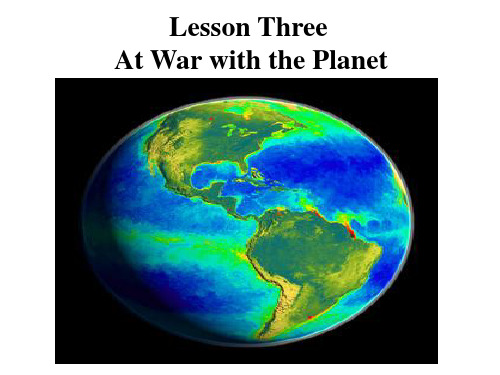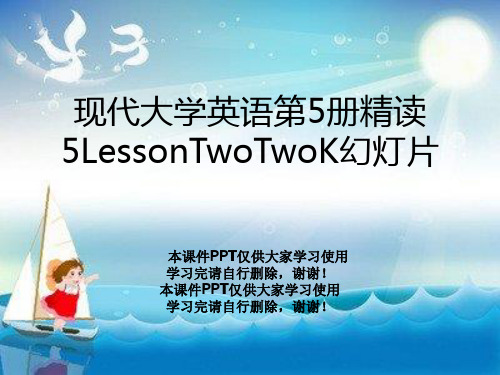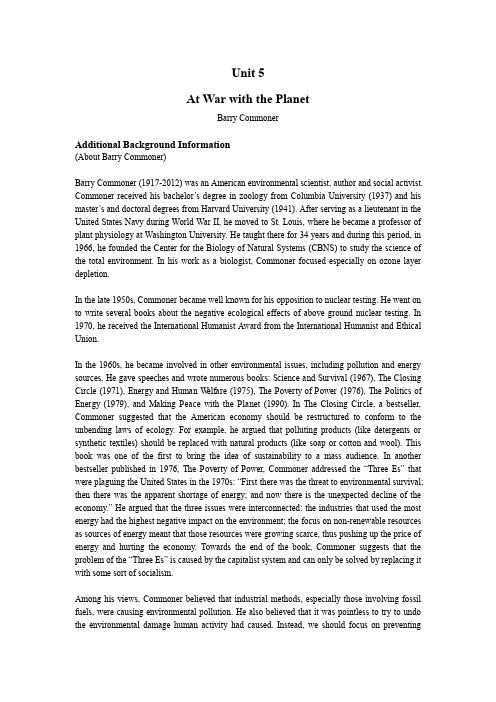精读-Unit5-at-the-war-with-the-planetPPT课件
Atwarwiththeplanet课件(精读6第三课).ppt

Gully Erosion (沟状侵蚀)
• a severe form of soil erosion,
• greatly accelerated by human activities such as urbanization, deforestation, overgrazing of cattle, etc. as they remove the remaining soil.
• Why is the image of the earth misleading?
• Can you name some other harmful effects that human exert on the environment?
Paras. 1-2
• exempt a. relieve, free 免除的 • breach v. to break a law, promise, agreement or
• Paras. 17-21: the issue should be understood in
terms of their interplay
• Paras. 22-23: how to solve the conflict between
the two worlds
Questions for Paras. 1-4
• Depletion of underground water caused by deforestation
Deforestation
• Widespread deforestation are caused by human activities, such as commercial logging, agriculture, mining, and oil exploration, etc.
Lesson 3 At War with the Planet课文解析PPT精品文档

Dust storm in Beijing
Dust storm(April,17, 2006)
The Author
The Author on the Magazine
About the Author
[美] 巴里·康芒纳(Barry Commoner)
《封闭的循环》 (THE CLOSING CIRCLE ) ——自然、人和技术
• During the late 1950s, Commoner became a well-known protester against nuclear testing. He went on to write several books about the negative ecological effects of above-ground nuclear testing. In 1970 he received the International Humanist Award from the
• Primitive forests are seriously damaged
• People don’t have Safe drinking water
现代大学英语6_第三课课件 At War with the Planet

• Part VI. (pp. 15-16) The consequences of failure of the ecosphere and the techno-sphere.
At War with the Planet
Barry Commoner
• Commoner's activist career can be defined as an attempt to weave together a larger vision of social justice. Since the 1960s, he has called attention to parallels between the environmental, civil rights, labor, and peace movements, and connected environmental decline with poverty, injustice, exploitation, and war, arguing that the root cause of environmental problems was the American economic system and its manifestations.
Outline of the essay (eight parts)
• Part Ⅰ (pp. 1) • Introduction: people live in 2 worlds, natural
现代大学英语第5册精读5LessonTwoTwoK幻灯片

will determine whether or not he/she gains his objective).
C. Conflict
Conflict is essential to plot. Without conflict there is no plot. It is the opposition of forces which ties one incident to another and makes the plot move. Conflict is not merely limited to open arguments, rather it is any form of opposition that faces the main character. Within a short story there may be only one central struggle, or there may be one dominant struggle with many minor ones.
the story “Two Kinds”
A. setting
B . plot
C. conflict D. Theme E. point of view F. Characters G. The Joy Luck Club and
Amy Tan
精读6 Lesson3 At War With The Planet

Language Points
words and phrases
2. unanticipated: adj: unexpected; something that you did not think that it was likely to happen. E.g. : The news may be unanticipated; nevertheless, it is true.
至少25万人死于这场非正义的战争和由此引发的饥荒。
Government have to make precautions to avoid the economic crisis and resultant unem的失业。
Language Points
How much does this sum of foreign money amount to in RMB?
这笔外币折成人民币是多少?
Language Points
words and phrases
5. resultant: adj: resulting; caused by the event just mentioned E.g. : At least a quarter of a million people have died in the unjust war and the resultant famines.
鉴于目前的形势,恐怕我还不能马上告诉你我的决定。
We must have a talk with respect to our relationship.
关于我们的感情,必须得谈一谈了。
Attitudes and views are sharply divided with respect to the missing aircraft of Malaysia Airline.
现代大学英语精读lesson5-25页PPT文档资料

2. chink
• Chink: refers to a narrow opening or crack, such as that between boards in the wall of a shed, through which the wind blows or one may peep
their respect)
Language points in text
• Touched by the moon: being close to nature
1. “Drive”
• Drive • 1) to move or travel in a vehicle • e.g. Shall we stop for dinner or shall we
away news photographers. • Drive off: to force away or back; repel • e.g. The army drove off the enemy with much
loss of life. • Drive sb. crazy (insane, mad, out of his mind,
• awesome: expressing or causing feelings of ~; remarkable, outstanding, marvelous
现代大学英语精读At War with the Planet

Solar energy fuels the expression energy -requiring processes of life.
fixes the planet's path around the sun.
bathes the Earth's surface fluctuating from day to night and season to season.
governs the gradual evolution and the current behavior.
chemical
biological
working place
material
mentality
farms、 factories、 laboratories
homes、 cars、food、 clothing
books、 paintings、 music、 poetry
acts of God
Para 2 : Now,on a planetary scale, this division has been breached.
not for what occurs in the natural world
physical
The natural world (Ecosphere)
The created world (Technosphere)
we accept responsibility for events of our own world
reason:
现代大学英语 精读6(第二版)BK6 教师用书 Unit 5

Unit 5At War with the PlanetBarry CommonerAdditional Background Information(About Barry Commoner)Barry Commoner (1917-2012) was an American environmental scientist, author and social activist. Commoner received his bachelor’s degree in zoology from Columbia University (1937) and his master’s and doctoral degrees from Harvard University (1941). After serving as a lieutenant in the United States Navy during World War II, he moved to St. Louis, where he became a professor of plant physiology at Washington University. He taught there for 34 years and during this period, in 1966, he founded the Center for the Biology of Natural Systems (CBNS) to study the science of the total environment. In his work as a biologist, Commoner focused especially on ozone layer depletion.In the late 1950s, Commoner became well known for his opposition to nuclear testing. He went on to write several books about the negative ecological effects of above ground nuclear testing. In 1970, he received the International Humanist Award from the International Humanist and Ethical Union.In the 1960s, he became involved in other environmental issues, including pollution and energy sources. He gave speeches and wrote numerous books: Science and Survival (1967), The Closing Circle (1971), Energy and Human Welfare (1975), The Poverty of Power (1976), The Politics of Energy(1979), and Making Peace with the Planet(1990). In The Closing Circle, a bestseller, Commoner suggested that the American economy should be restructured to conform to the unbending laws of ecology. For example, he argued that polluting products (like detergents or synthetic textiles) should be replaced with natural products (like soap or cotton and wool). This book was one of the first to bring the idea of sustainability to a mass audience. In another bestseller published in 1976, The Poverty of Power,Commoner addressed the “Three Es” that were plaguing the United States in the 1970s: “First there was the threat to environmental survival; then there was the apparent shortage of energy; and now there is the unexpected decline of the economy.” He argued that the three issues were interconnected: the industries that used the most energy had the highest negative impact on the environment; the focus on non-renewable resources as sources of energy meant that those resources were growing scarce, thus pushing up the price of energy and hurting the economy. Towards the end of the book, Commoner suggests that the problem of the “Three Es” is caused by the capitalist system and can only be solved by replacing it with some sort of socialism.Among his views, Commoner believed that industrial methods, especially those involving fossil fuels, were causing environmental pollution. He also believed that it was pointless to try to undo the environmental damage human activity had caused. Instead, we should focus on preventingfuture destruction; for the most part, the solution to environmental problems lies in not destroying the environment in the first place.Commoner’s solutions for man y problems are considered radical. He was a strong advocate of renewable energy sources, specifically solar energy, which would decentralize electric utilities and use sunlight as an alternative power source for most energy consumers.Commoner also had strong views on the social causes of the present environmental situation. He argued, for example, that eliminating Third World debt payments would lessen the economic gap between developed and less developed countries and end the desperation that usually results in overpopulation. This debt forgiveness could also compensate for previous decades of damage inflicted on such countries. Commoner also called for redistribution of the world’s wealth.In 1980, he founded the Citizens Party to serve as a vehicle for his ecological message, and he ran for President of the United States in the 1980 election. After his unsuccessful bid for the White House, Commoner returned to New York City, and moved the Center for the Biology of Natural Systems to Queens College. He was a member of the American Association for the Advancement of Science.Commoner criticized Ronald Reagan and George Bush for regulating pollution and not preventing it. In his book Making Peace with the Planet, Commoner points out, "Solving the environmental question-- as distinct from somewhat diminishing its effect--is fundamentally a political problem because it calls for the establishment of a new, social form of governance over decisions that are now exclusively in private, corporate hands." He effectively argues that recognizing this fundamental reality is essential to achieving an environmentally sustainable society.Famed social activist Ralph Nader reflected on Commoner’s legacy in a public statement following his death: “Dr. Barry Commoner sho uld be considered the greatest environmentalist of the 20th century,” Nader said. “His great work is reflected in his many campaigns that succeeded and in raising public consciousness to the silent violence of toxic pollution.”Making Peace with the PlanetDespite 20 years of painful treatment and vast expenditures the United States' curative environmental efforts have failed. A completely different approach is in order. In his latest book, Making Peace with the Planet, Barry Commoner makes this case. What has failed, according to Commoner, is the attempt, starting with Earth Day 1970, to significantly reduce if not eliminate land, air and water pollution.Commoner's book is an extremely accessible and hard-hitting analysis of the environmental crisis. He weaves together specific issues, such as the economic impact of large-scale conversion to organic agriculture, with a broader commentary on the political economy of environmental policy-making. In doing so, Making Peace with the Planet provides a sweeping picture of the environmental crisis, including: a description of the conflict between the ecosphere, or the environment, and the technosphere, which includes the goods and systems produced by humanactivity; the failure of existing environmental regulations and the costs of that failure; the reasons behind this dismal record; and the role of citizen activism in dealing with the problem. Perhaps most importantly, the book outlines Commoner's concrete alternative proposals that would, if implemented, truly stop the technosphere's assault on the ecosphere.…Commoner describes how the technosphere can be redesigned in a manner that does not threaten the continued viability of the ecosphere. He provides examples of currently available, environmentally sound technologies that are not inimical to continued economic growth. Electricity generation and agriculture are two case studies used to support this argument.Commoner notes that electricity generation is based primarily on the burning of fossil fuels, which produces a host of noxious emissions, including sulfur dioxide and nitrogen oxides. The book offers a two-step process by which electric power generation's negative environmental impact would be reduced and ultimately eliminated through a transition to solar energy. The initial phase requires a decentralized system using small co-generator plants which would utilize the heat which is wasted by most big plants and would run on cleaner burning natural gas. This system is much more efficient and therefore economical. As Commoner writes, "With the co-generator operating at a much higher level of both economic and thermodynamic efficiency than a conventional power plant, fuel consumption is reduced, decreasing both environmental impact and the cost of energy--a net gain for both the economy and the environment."Because solar electricity is most cost-effective at the point of use, Commoner argues that the decentralized nature of the co-generator system makes it an ideal prelude to the widespread use of solar energy. Such a transition makes economic sense in the long run. Fossil fuels are a nonrenewable resource; as they become less accessible, the cost of extraction increases to the point where the energy needed to retrieve them is greater than the yield. "As a result, as long as we continue to rely on nonrenewable fuels, especially oil and natural gas, a progressively larger fraction of the economic system's output must be invested in producing energy." Yet the technology already exists, in the form of the photovoltaic cell, for example, to sever the reliance on fossil fuels.Commoner also describes how agriculture's post-World War II addictive reliance on chemical pesticides makes it one of the chief sources of water pollution. Replacing this system with large-scale organic farming would be an economically feasible means of eliminating chemical dependence. A five-year comparative study of 14 large, organic farms and an equal number of conventional farms, for example, revealed that although output was 8.5 percent less on the organic farms, "the resultant loss in income was exactly balanced by not buying agricultural chemicals."Commoner's prescriptions for change possess a certain intrinsic logic that imputes to them an air of inevitability. This is somewhat deceiving because it gives the impression that rationality will overcome the structural impediments to such a scenario: mainly the capitalist system's emphasis on private control of production decisions and profit seeking.But, Commoner notes, the concentration of decision-making power in a few hands preventsrational policies, which would benefit the majority of the population, from being enacted. The widespread use of cost-benefit analysis, which entails that a financial formula be applied to the cost of saving lives and reducing disease, is one of the more odious manifestations of elite decision-making. Commoner explains how the cost-benefit approach is used by business and, in the case of the Reagan and Bush administrations, by the government, to justify the continued poisoning of the ecosphere. In addition, cost-benefit analysis victimizes poor people. "Thinly veiled by a facade of seemingly straightforward numerical computation, there is a profound moral or political judgment: that poor people who lack the resources to evade [toxic emissions] should be subjected to a more severe environmental burden than rich people." Commoner cuts through the rhetorical constructs used by industry to obfuscate the real issues and in so doing exposes their moral bankruptcy. As he puts it, "This narrow segment of society makes the decisions that obligate the rest of us to participate in the ecological war. And it is the corporate generals who reap the short-term—and short-sighted—economic benefits."Commoner acknowledges the difficulty involved in questioning this system. "The view that the nation's welfare depends on 'private enterprise' is so deeply embedded in American political life that even to raise the question of possible public intervention is often an open invitation to ridicule."Yet raise the question is precisely what Commoner does in Making Peace.He postulates that "Solving the environmental question—as distinct from somewhat diminishing its effect--is fundamentally a political problem because it calls for the establishment of a new, social form of governance over decisions that are now exclusively in private, corporate hands." He effectively argues that recognizing this fundamental reality is essential to achieving an environmentally sustainable society.Commoner is sober in his outlook, but he communicates a guardedly optimistic view based on certain precedents, most recently the revolutions in Eastern Europe. How applicable they are remains open to interpretation. One thing is certain, however. Making Peace with the Planet is an accessible synthesis, grand in its scope and accurate and persuasive in its detail. Commoner critiques existing structures and problems but, very significantly, offers a substantive alternative vision. His ideas for changing the systems of production are compelling. Unfortunately, the political will and leadership to move this agenda are lacking.(Source: The Multinational Monitor, May 1990)Structure of the TextPart I (Para.1)Introduction: The author points out that we live in two worlds—the natural world and the world we have created—and defines the two worlds.Part II (Paras. 2-5)The author presents the thesis statement of this essay: human activity has profoundly altered global conditions, and the two worlds are at war.Part III (Paras. 6-16)In the ecosphere, there are four basic laws. In contrast, the technosphere is governed by processes totally different from those laws.The first law of the ecosphere is “Everything is connected to everything else”; many man-made objects in the technosphere are often narrowly defined and are harmful to the environment. (Paras. 6-9)The second law of the ecosphere is “Everything has to go somewhere", which, together with the first, expresses the importance of cycles in the ecosphere. Unlike the ecosphere, the technosphere is dominated by linear processes. (Paras. 10-11)The third law “Nature knows best” shows that the ecosystem is a harmonious structure which is the outcome of 5 billion years of biological evolution, while the objects and materials in the technosphere reflect a rapid and relentless process of change and variation, untested by evolution. (Paras. 12-14)The fourth law of the ecosphere is “There is no such thing as a free lunch.” A free lunch is a debt. When the debts represented by environmental pollution are created by the technosphere and transferred to the ecosphere, damage is unavoidable. (Paras. 15-16)Part IV (Paras. 17-20)Since the two worlds are at war, the issue can only be understood in terms of their interplay. The solution to ending the war is not by taking sides: neither the ecosphere nor the technoshpere can be ignored.P art IV (Para. 21)Conclusion: The author stresses the importance of making peace with the planet.Detailed Study of the Text1.What is the main idea of Paragraph 1?This is the introduction, in which the author points out that we live in two worlds—the natural world and the world we have created. He then defines each world.2.Its storms, droughts, and floods are “acts of God,” free o f human control and exemptfrom our responsibility. (Para. 1)In the natural world, storms, droughts and floods are acts caused by natural forces. They are not controlled by humans and are not the result of human activity, so we are not responsible for them. In almost all religions, it is believed that storms, droughts and floods are acts performed by God. Here “acts of God” are in quotation marks, showing that the author is not religious.3.What is the main idea of the section made up of Paragraphs 2-5?In this section, the author points out that human activity has profoundly altered global conditions and that the two worlds are at war.4.Now, on a planetary scale, this division has been breached. (Para. 2)Globally, the two worlds are no longer separated. Humans have tampered with natural forcesand caused damage to the natural world. This is the topic sentence of the Paragraph, further explained and proved by the sentence that follows. It is a transitional sentence, linking up with the first Paragraph and also leading to further explanation of the interaction between the two worlds in subsequent Paragraphs.5.With the appearance of a continent-sized hole in the Earth's protective ozone layer andthe threat of global warming, even droughts, floods, and heat waves may become unwitting acts of man. (Para. 2)Paraphrase:Owing to human activity, a hole as big as a continent has appeared in the Earth’s protective ozone layer and global warming threatens us. At the same time, human beings may cause even droughts, floods, and heat waves without their intention and realization.the appearance of a continent-sized hole in the Earth’s protective ozone layer: Here the author refers to ozone depletion, particularly a massive springtime decrease in ozone over Earth's polar regions.protective ozone layer: Ozone(臭氧)is a poisonous gas with a strong smell that is a form of oxygen. The ozone layer absorbs 97–99% of the Sun’s medium-frequency ultraviolet light, which otherwise would potentially harm exposed life forms on and near the surface of the Earth.6. Like the Creation, the portending global events are cosmic: (Para. 3)Paraphrase:Like the creation of the universe, events that happen in this world may have vast effects on the relationship between the planet Earth and the sun.the Creation: the making of the world, especially by God as described in the Bible.Translation: 与宇宙的诞生一样,这些预兆会发生的全球事件是关乎整个宇宙的。
- 1、下载文档前请自行甄别文档内容的完整性,平台不提供额外的编辑、内容补充、找答案等附加服务。
- 2、"仅部分预览"的文档,不可在线预览部分如存在完整性等问题,可反馈申请退款(可完整预览的文档不适用该条件!)。
- 3、如文档侵犯您的权益,请联系客服反馈,我们会尽快为您处理(人工客服工作时间:9:00-18:30)。
2
He became a professor of plant physiology at Washing ton University in 1947 and taught there for 34 years.
Durin 1966, h Center Natur &eer In Academic
Environment books
The Closing Circle The Poverty of Power Making Peace with the Planet
Influence
Time magazine introduced a section on the environment in th 1970 issue, featuring articles on the "environmental crisis", an from Richard Nixon's State of the Union address, calling it, "T question of the '70s". The magazine called Commoner, the "Pa ecology" for his work on the threats to life from the environme consequences of fallout from nuclear tests and other pollutants soil, and air. Time's cover represented a "call to arms", to mob opinion by appeals to conscience. The following month, the firs Day took place, which saw 20 million Americans demonstratin
General
Structure
Part III: The roots of the conflicts: -- The first law: Everything is connected to everything else VS. T component parts have a very different relation to th surroundings. ( Paras. 6-9 ) -- The second law: the closed cyclical process of ecosphere and t linear process of technosphere ( Paras. 10-11 ) -- The third law: the consistent and harmonious nature of t ecosphere as contrasted to the rapid change and variation of t technosphere ( Paras. 12-14 )
4
In the late 1950s, Commoner became well known for his opposition to nuclear weapons testing, becoming part of the team which conducted the Baby Tooth Survey, demonstrating the presence
General Structure
Part I ( Para. 1) This is the introductory part in which the author raises the theme that people live in two worlds. Part II ( Para. 2-5 ) In this part, the author explains the
题
Party ca
and politician. He was a
the 1980
leading ecologist and
election.
among the founders of
studying
the modern
fallout f
Career In Academic
1
After serving as a lieutenant in the Naval Air Force during World War II, Commoner moved to St. Louis, Missouri, and he became
5
In 1958, he helped found the Gre Committee on Nuclear Informati thereafter, he established Nuclea a mimeographed newsletter publ office, which later went on to become Environment magazine.
At The War With
The Planet
He was
(May 28, 1917 –
the Crit
September 30, 2012)
Project
was an
for Biolo
American cellular
Systems
biologist,
the Citiz
college professor,
General Structure
Part IV ( Paras. 17-21 ) Since the two worlds are at war, the issue can only be understood in terms of their interplay. It will be dangerous for us to take sides, ignoring the interests of one combatant or the other. Para V ( Paras. 22-23 ) Conclusion: the author once again stresses the importance of understanding the interplay of the two worlds and on the basis
